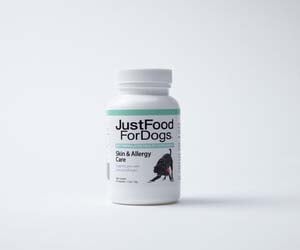How To Help Your Dog With Itchy Skin
There are a variety of reasons why your dog is suffering from itchy skin. Read to learn the potential causes and how to manage it.
It’s a fact of life: All dogs scratch. You’ve likely seen your dog paw at their nose or scratch behind their ears on more than one occasion. But chronic scratching is not normal. If your dog scratches obsessively, itchy dry skin could be to blame.
Itchy afflictions are a lot more common than you might think. Recent research from the American Veterinary Medical Association (AVMA) found that skin disorders, allergies, and ear infections—all conditions that can cause dog itching—were among the top health concerns for pet owners.
How to Tell If Your Dog’s Itchy Skin Is a Problem

According to Dr. Laura Wilson, DVM, Dipl. ACVD, a board-certified veterinary dermatologist with JustFoodForDogs, occasional itchiness is not a cause for concern. But compulsive scratching, licking, or chewing warrants a call to the veterinarian.
“Typically, a dog scratches an itch and then goes on with their life; an itchy dog keeps going and going,” Wilson says. “Excessive scratching could cause your dog to lick or scratch themselves bald, or they might keep you up at night with incessant scratching.”
Other signs that your doggy is experiencing more than a simple itch are hot spots, rashes, dandruff, or excessive shedding. If your dog’s increased scratching is accompanied by any of these symptoms, that’s an indication that your dog may be dealing with a more serious skin issue.
Common Causes of Itchy Skin in Dogs
A number of health issues from food and environmental allergies, yeast infections, problematic parasites, and the like bring about a case of itchy skin. In consultations with pet owners, Wilson asks questions about seasonal patterns, changes to diet, and physical symptoms such as gas and upset stomach to assess what’s causing the itchy areas and how to treat them.
Want to find out what could be causing your dog’s itchy skin? Keep an eye out for these symptoms to narrow in on the possible source of your dog’s skin condition.
Parasites
An infestation of fleas, scabies, or other insects can cause your dog to scratch incessantly, even more so if your pet is sensitive to the saliva of the biting pest. Classic signs of flea allergies are often found around the lower back, base of the tail, inner thighs, and rump, notes Wilson. Internal parasites like tapeworm and hookworm can also lead to itchy skin.
To diagnose the cause, your vet may conduct a physical exam and possibly a skin scrape of the affected area to look for signs of external parasites or take a stool sample to look for internal parasites that could be causing excessive itching.
Environmental Allergies

Dogs, like their owners, can suffer from seasonal allergies. In fact, the American Animal Hospital Association notes that an estimated 10 percent of dogs suffer from skin allergies, also known as atopic dermatitis.
Wilson notes that dust, grasses, pollen, and mold are all common allergens. Since most of these allergens appear in our environment seasonally, dogs may only show irritated skin at certain times of the year.
“Dogs absorb allergens through their skin,” Wilson says. “They will lick their paws and other places on their fur to remove pollen and allergens, which can trigger an allergic reaction that causes them to become itchy.”
In addition to scratching, licking, or chewing their skin to relieve their itch, one study found that severe cases of allergy-related itchiness can cause such psychological stress in dogs, they may exhibit excessive grooming, chewing, mounting, hyperactivity, and other problem behaviors. Severe allergic reactions can also cause secondary infections, including ear infections, Wilson adds.
A veterinary dermatologist can do allergy testing to determine if and what seasonal allergens are causing your dog’s itchy skin. That entails a skin prick test, during which allergens are injected under a shaved portion of skin to see if they trigger an allergic response.
Food Allergies
In the pet world, food allergies are a hot topic. Take one look at all the hypoallergenic options available in the dog food aisle as proof.
However, research shows that only two percent of dogs have food allergies. What’s more common are food sensitivities or intolerance. While both food allergies and sensitivities can trigger itchy skin (and sensitivities are often accompanied by rumbling tummy, gas, or diarrhea), it’s important to understand what’s causing the reaction before rushing to eliminate certain ingredients from your dog’s diet.
Here’s why: Ingredients aren’t the only things that can cause a reaction in dogs with food allergies or sensitivities. Chemicals, additives, and flavorings are also triggers. And some dogs develop intolerance to highly-processed or lower-quality ingredients, over time.
There’s only one way to identify if food is causing your dog’s itchy skin and what to do about it. Wilson suggests a strict feeding trial done under the supervision of a veterinarian to determine if food allergies are causing the itchiness, as well as what sort of dietary adjustment might resolve it. Sometimes, dogs thought to be allergic can do incredibly well on a diet of fresh whole foods. A feeding trial can help isolate whether it’s an ingredient or the type of food your dog is eating that needs to change.
Remedies & Treatment for Your Dog’s Itchy Skin

It can be heartbreaking to watch your pet endure endless bouts of itchy skin. But there are several steps pet parents can take to help deliver both short-term and long-term relief.
“For mild cases, a lukewarm bath with a soothing, anti-itch product can provide temporary itch relief,” says Wilson.
You’ll find no shortage of commercial antibacterial, antifungal, and anti-itch treatments for dogs in the aisles of your local pet supply store. Look for moisturizing dog shampoos specifically targeting dry, itchy skin, as well as topical ointments and sprays. Soothing shampoo ingredients include chamomile and oatmeal.
Tried-and-true natural remedies can help dogs with itchy skin. Wilson recommends several easy, all-natural treatments:
- Apply soothing coconut oil or aloe vera directly to the afflicted skin. Melaleuca (tea tree) oil can also be used, but only if properly diluted to only 0.1-1.0 percent of its original strength, otherwise it can be toxic to dogs.
- Give your dog an old-fashioned oatmeal bath or scrub them down with a homemade dog shampoo made from equal parts ground oatmeal (or colloidal oatmeal) and warm water.
- Rinse your dog with a 50-50 mixture of apple cider vinegar and water to ease the itch.
Long-Term Relief
For longer-term relief for your dog’s itchy skin, work with your veterinarian to diagnose and treat the root cause. Depending on the diagnosis, your veterinarian might prescribe medications, regular parasite protection or dietary changes. They may also recommend powerful medicated shampoos to keep your dog from scratching around the clock.
If environmental allergens are causing non-stop scratching, your veterinarian could recommend avoiding or minimizing exposure to items like grasses and mold that trigger itchy flares. Alternatively, they may prescribe antihistamines, or even immunotherapy. Immunotherapy introduces small amounts of the allergen via injections or drops under the tongue to help them build a tolerance.
Research published in the journal Veterinary Dermatology found that giving allergy shots to dogs with itchy skin for 10 months led to a 60 percent improvement in their symptoms with no side effects.
Parasite protection is another common treatment your dog needs if they are scratching due to bug bites, fleas, scabies, hookworms, or other parasites. Your veterinarian might apply a topical product to the skin to kill external parasites. Or they may prescribe oral medications for internal parasites. Once the parasites are killed, the itching should stop.
Nutritional Support for Itchy Skin
A new diet may help support chronic itchiness. Wilson often prescribes a strict feeding trial for dogs that appear to have food allergies or sensitivities.
During the eight-week trial, she offers foods with novel ingredients like the Venison and Squash Recipe or a custom-designed diet formulated with rabbit or quinoa — ingredients that are uncommon in commercial dog foods.
“The idea is to expose dogs to ingredients that are different from the ingredients in their current diet,” she explains. “After eight weeks, we feed them their original food and watch for symptoms to confirm if it was something in their food causing the allergic reaction.”
It’s important to note that even dog foods that claim to be hypoallergenic may not be appropriate for your dog. The best dog food for a dog with itchy skin contains none of the ingredients that trigger allergic reactions or food sensitivities.
In addition to diets that omit specific trigger ingredients, JustFoodForDogs also offers several whole food meal formulations that may help promote skin health, like their Joint & Skin Support recipe, made with pork tenderloin, quinoa, kale, carrots, Fuji apples, and their Fish & Sweet Potato recipe.
Supplements that support a healthy inflammatory response may also help your dog’s itchiness. Studies have found that giving dogs a probiotic supplement decreases their response to allergens and reduces the severity of itchy skin.
JustFoodForDogs offers a Skin & Allergy Care supplement made with olive leaf extract to soothe skin-related issues associated with seasonal allergies. Wilson recommends fish oil Omega-3 fatty acid supplements for healthier skin, as well.
How to Promote Healthy Skin in Dogs
You don’t need to wait until your dog is scratching, biting, and chewing to think about their skin health. A proactive approach that promotes healthy skin helps your dog look and feel their best before a skin infection happens.
And even if you can’t head off skin issues before they happen, using vet-recommended treatments in conjunction with home remedies and over-the-counter products can help your dog feel better on the inside and the outside.
“The skin is the largest organ and it’s important to take care of it,” Wilson says. Keep your eye out for symptoms such as hot spots, dandruff, excessive shedding or even a change in your dog’s fur. According to Wilson, “A dry, brittle coat could be a sign that your dog has inflamed skin.”
If you suspect your dog has moved from occasional scratching to chronic itchiness, call your veterinarian to get a diagnosis and treatment plan. The earlier you address the issue, the better your dog will feel.
Jodi Helmer writes about companion animals and livestock for NPR, Out Here, National Forests, WebMD, Hobby Farms, and Backyard Poultry. She shares her North Carolina home with a pack of elderly rescue dogs that like to bark at the donkey, goats, and chickens.
This content is for informational use only and does not replace professional nutrition and/or medical advice, diagnosis, or treatment. It is not a substitute for and should not be relied upon for specific nutrition and/or medical recommendations. Please talk with your veterinarian about any questions or concerns.
Marsella, Rosanna, Domenico Santoro, and Kim Ahrens. 2012. “Early Exposure to Probiotics in a Canine Model of Atopic Dermatitis Has Long-Term Clinical and Immunological Effects.” Veterinary Immunology and Immunopathology 146 (2): 185–89. https://doi.org/10.1016/j.vetimm.2012.02.013.
Kim, Hyejin, Irfan A. Rather, Hyunwook Kim, Sungsoo Kim, Taeeun Kim, Jaeyoung Jang, Jimin Seo, Jeongheui Lim, and Yong-Ha Park. 2015. “A Double-Blind, Placebo Controlled-Trial of a Probiotic Strain Lactobacillus Sakei Probio-65 for the Prevention of Canine Atopic Dermatitis.” Journal of Microbiology and Biotechnology 25 (11): 1966–69. https://doi.org/10.4014/jmb.1506.06065.








